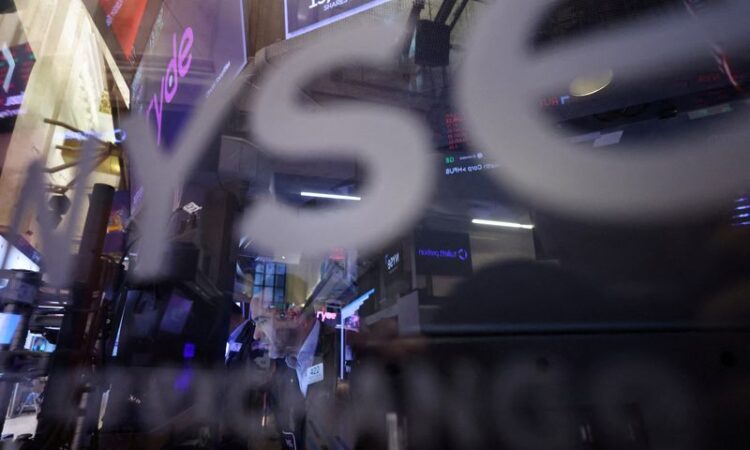
Investing.com — Wall Street looks set to start the new week on a positive note, although the Fed’s inflation gauge, due at the end of the week, could determine near-term direction. Apple has run foul of European Union rules, while Broadcom is working with Chinese firm ByteDance over the supply of AI chips.
1. Futures just higher ahead of key inflation release
U.S. stock futures edged higher Monday, starting the last week of the first half of the year near record highs, largely boosted by the enthusiasm surrounding artificial intelligence.
By 04:20 ET (08:20 GMT), the contract was 70 points, or 0.2%, higher, climbed 12 points, or 0.2%, and rose by 45 points, or 0.2%.
The , a broad-based benchmark index, hit a new intraday record late last week, and is up almost 15% so far this year, while the tech-heavy has gained almost 18%.
The blue-chip has lagged, by contrast, gaining just under 4% in the first half of the year.
The main focus this week will be Friday’s release of the May data, the Federal Reserve’s preferred inflation gauge.
Investors have been trying to gauge when the U.S. central bank will start cutting interest rates, with Fed officials expressing their desire for more inflation data confirming the easing of prices before agreeing to a reduction.
There are also a number of key companies earnings this week, including FedEx (NYSE:), Micron (NASDAQ:), Walgreens Boots Alliance (NASDAQ:) and Nike (NYSE:).
2. Apple has breached EU rules – EC
Apple (NASDAQ:) has run into regulatory difficulties in the European Union.
The European Commission, which also acts as the EU antitrust and technology regulator, said Monday the iPhone maker’s App Store rules breach EU tech rules because they prevent app developers from steering consumers to alternative offers.
The EU executive said it was also opening an investigation into Apple over its new contractual requirements for third-party app developers and app stores.
“None of these business terms allow developers to freely steer their customers. For example, developers cannot provide pricing information within the app or communicate in any other way with their customers to promote offers available on alternative distribution channels,” the EU watchdog said.
The EU opened an investigation into the U.S. tech giants in March under a landmark new law known as the Digital Markets Act.
So-called anti-steering rules were one of the big areas of focus of the probe. Under the DMA, tech firms are not allowed to block businesses from telling their users about cheaper options for their products or about subscriptions outside of an app store.
3. ByteDance working with chipmaker Broadcom – Reuters
Chinese technology firm ByteDance is working with U.S. chipmaker Broadcom (NASDAQ:) to develop an advanced artificial intelligence processor, even as the U.S. is attempting to restrict the export of these vital chips to its main economic rival.
A deepening of the partnership between the two companies, which Reuters reported on Monday, represents more efforts by Chinese technology firms to secure the supply of advanced AI chips, after the U.S. blocked several major chipmakers, most notably NVIDIA Corporation (NASDAQ:), from selling their most advanced AI technology to China.
The 5 nanometre chip will be compliant with U.S. export curbs and is likely to be outsourced for manufacturing to TSMC, the world’s biggest contract chipmaker.
Bytedance and Broadcom already have partnerships in place, with the TikTok owner having purchased several AI-linked chips from the firm over the past couple of years.
This follows a broad push into generative AI over the past year, which has served as a major source of demand for global chipmaking firms.
4. EU to hold EV trade talks with China
China and the European Union have agreed to start talks on the planned imposition of tariffs on Chinese-made electric vehicles (EVs) being imported into the European market.
The European Commission announced earlier this month that it is planning to impose provisional duties on EVs produced in China of up to 38.1%, on top of its standard 10% tariff for car imports.
The duties are due to apply by July 4.
The news prompted the ire of Beijing, with Chinese authorities hinting at the possibility of retaliatory measures.
The state-aligned Global Times newspaper reported on Sunday that China wants the European Union to revoke its decision to impose provisional tariffs on Chinese electric vehicles.
While the talks hint at the possibility of a de-escalation of this trade conflict, the United States also hike tariffs on Chinese cars in May, suggesting coordination in the West’s trade war with Beijing.
5. Yen intervention talk on the rise
Intervention talk is on the rise in foreign exchange markets Monday, after the Japanese yen weakened to its lowest level against the dollar since April 29 earlier Monday, with the pair climbing to a high of 159.93.
In April the pair touched a 34-year low of 160.245, leading to Japanese authorities spending roughly 9.8 trillion yen to support the currency.
The yen has come under renewed pressure after the Bank of Japan’s decision this month to hold off on reducing bond-buying stimulus until its July meeting.
The yen losses prompted Japan’s top currency diplomat Masato Kanda to say on Monday that authorities will take appropriate steps if there is excessive foreign exchange movement.
“We will firmly respond to moves that are too rapid or driven by speculators,” Kanda said, while noting that the authorities have no specific levels in mind on when to intervene.
Kanda said that the addition of Japan to the U.S. Treasury’s foreign exchange manipulation monitoring list had “absolutely no impact” on Tokyo’s policy options.
A U.S. Treasury report issued last week added Japan to its foreign exchange monitoring list alongside six countries that were on the previous list.






